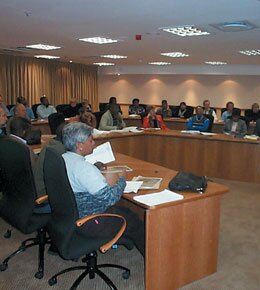|
|

|
Download the pdf for this section.
|
|
|
Executive Director
Ms Roshani Rampersadh
Tel: +27 12 302 2448
E-mail: |
|
|
Corporate Services (CS) provides support to the different Research Programmes within the HSRC. It comprises human resources (HR), information technology and systems (IT), project finance, information services (IS), and building and facilities.
Building on the comprehensive restructuring during the previous reporting period, the administrative components in CS were consolidated in the current financial year and a start was made on new management systems. New senior appointments were made to fill the vacancies that existed in March 2002: directors for human resources, finance and information tech-nology were appointed.
Current and recently completed projects
In September 2002, a planning workshop with research Executive Directors and the senior management team in CS resulted in the launch of Project Phoenix. This project was an integrated attempt to meet immediate internal user needs in the short-term, by significantly improving service delivery in three key areas: IT infrastructure, websites and management information.
The IT infrastructure was improved by increasing bandwidth between offices, deploying new file servers, installing new software and outsourcing elements of IT support to enhance end-user support. The HSRCs websites on the Internet and the intranet were redesigned. The websites are now easier to navigate, look more appealing, and users have access to richer and more up-to-date content. As the third aspect of Project Phoenix, the HSRCs information services were radically updated and electronically enhanced to support the high research information needs of the Research Programmes. The HSRCs new virtual library is now nationally accessible to researchers. Information management was improved by providing online access to flow diagrams of key business processes. A key new feature is the provision of projects and research outputs databases. Electronic templates, corporate stationery, and various other guides and forms were posted on the intranet to assist with the preparation of proposals, research reports and other aspects of project administration.
Project Phoenix provides a foundation for the intended HSRC management information system. Business processes were documented, infrastructural weaknesses identified and mechanisms put in place to improve the flow of information prerequisites to the subsequent introduction of a new integrated system. To enhance the delivery of large-scale, multi-year socio-economic research undertakings in the current and long-term, the HSRC envisages the installation of a project management system and a seamlessly integrated, full-featured support-services system. The main support functions are human resources (including remuneration, performance management and skills development); financial management; risk management and asset management. The investigative phases have been completed, and the tender committee is expected to finalise its decision in the 2003/04 financial year.
HSRC staff voted in favour of amalgamating the existing staff association into the Public Services Association (PSA) during February 2001. Following detailed negotiations with the Union, a recognition agreement was signed on 9 May 2002. Comprehensive new terms and conditions of employment were also negotiated with the PSA. The collective agreement, signed in February 2003, introduced remuneration packages for all staff on a cost-to-company basis and addressed historical imbalances in medical aid and housing subsidies. The existing performance management system has been enhanced with the definition of key performance areas for researchers, and the further refinement of administrative key performance areas. All key performance areas, in research and Corporate Services, are now aligned to the HSRC COUPE strategy.
Following Union representations and discussions with management during 2002/03, Council decided that three main elements should be developed and documented in HSRC labour relations policy. These are trends and measures regarding the improvement of representivity (including the expansion and updating of the HSRCs employment equity policy); arrangements for the professional development of staff; and the means for improved internal communication. Improved internal communication includes a development, previously suggested by the Executive Directors to Council, to establish a researcher forum to enable greater involvement of the wider body of researchers in relevant aspects of HSRC decision-making.
Regarding physical infrastructure, the growth in research has led to an increase in accommodation in Cape Town and the relocation of the Durban office to larger premises. By the end of the 2002/03 reporting year, two new offices were opened, in Bloemfontein and Port Elizabeth. The video-conferencing centre, comprising a large conference room linking the Pretoria office with Cape Town and Durban, was completed. It has been widely used from the outset. A social area to complement the centre will be completed in the next financial year.
The Audit Committee monitors risk management in the HSRC on an ongoing basis. A three-year audit plan to address the risk profile has been developed, and includes the development of a fraud prevention plan, a corporate governance review, and an information technology audit. A report on the progress of these key areas is expected towards the middle of 2003.
Future developments
A telephone switchboard that spans all the HSRC sites is envisaged, and arrangements for its integration with the HSRCs national wide-area network have been discussed with Telkom. Also on the cards are proposals to refurbish the Pretoria office space to create a friendlier environment for employees, plus plans to renovate the exterior and improve safety within the building.
|
|
